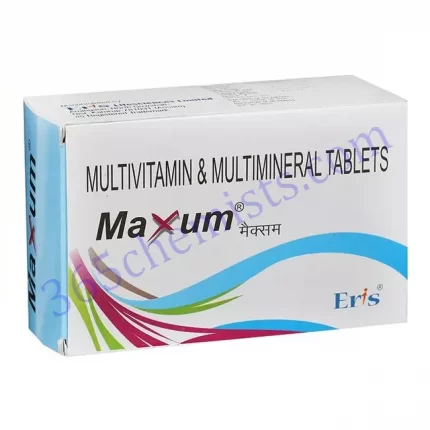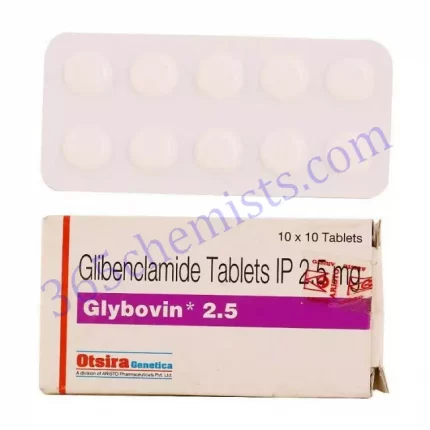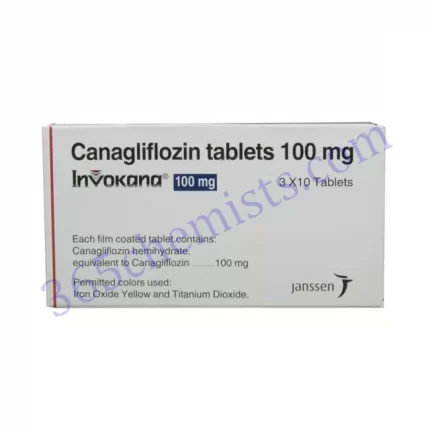Maxformin 1000mg Tablet (Metformin): Effective Glycemic Control for Type 2 Diabetes
Metformin is the primary component of the pharmaceutical preparation known as Maxformin 1000mg Tablet. It is a medication that is frequently recommended for the management of diabetes mellitus type 2. Glycemic control can be significantly enhanced with the help of the Maxformin 1000mg Tablet, which is a member of the biguanide medicine class and is often used for this purpose. This article will provide a detailed explanation of Maxformin 1000mg Tablet, including topics such as its mode of action, indications, dosage, potential adverse effects, and precautions.
Mechanism of Action
Metformin, which is the active ingredient in Maxformin 1000mg Tablet, works by lowering the amount of glucose produced by the liver, lowering the amount of glucose absorbed by the intestinal tract, and increasing insulin sensitivity in the tissues that are peripheral to the liver. It does this by stimulating the production of an enzyme known as AMP-activated protein kinase (AMPK), which is essential for the control of glucose metabolism. Metformin helps persons with type 2 diabetes mellitus lower their blood glucose levels and improve their glycemic control by targeting numerous pathways involved in glucose regulation.
Indications
The treatment of diabetes mellitus type 2 is the primary purpose for which the Maxformin 1000 mg Tablet is recommended. It is usually administered as an initial therapy or as an addition to diet and exercise when diet and exercise alone are not adequate to manage blood glucose levels. This happens when lifestyle adjustments alone are not sufficient to regulate blood glucose levels. Depending on the treatment strategy that an individual is following, the Maxformin 1000mg Tablet may be administered on its own as monotherapy or in conjunction with other diabetes drugs.
Dosage and Administration
It is possible for the recommended dosage of Maxformin 1000mg Tablet to change based on variables such as the patient’s blood glucose levels, their reaction to treatment, and any other diabetes drugs they are taking at the same time. It is essential to take the medication exactly as directed by the healthcare expert, including adhering to the dosage and administration instructions that have been prescribed. In order to lessen the severity of gastrointestinal adverse effects, the Maxformin 1000mg Tablet is normally used orally, either once or twice daily with meals. It is important to take the tablet as directed, without crushing or chewing it.
Related Product
Maxformin 750mg Tablet
Maxformin 1000mg Tablet
Side Effects
Maxformin 1000mg Tablet, like any other medicine, carries the potential to produce negative effects. Symptoms related to the gastrointestinal tract, such as nausea, vomiting, diarrhoea, and abdominal discomfort, are among the most often reported adverse effects. These unwanted effects are often modest and short-lived, and it is possible to lessen their severity by taking the drug in conjunction with food. Metformin may, in extremely unusual circumstances, result in lactic acidosis, a potentially life-threatening disease that calls for prompt medical intervention. It is essential to be knowledgeable about the symptoms of lactic acidosis, which include rapid breathing, soreness in the muscles, and unusual exhaustion.
Precautions
Before beginning treatment with Maxformin 1000mg Tablet, healthcare providers should take into account the patient’s medical history and evaluate the medication’s possible risks and benefits. Patients who have previously demonstrated an extreme sensitivity to metformin or any of its components should not take the Maxformin 1000mg Tablet. It is essential to supply the healthcare provider with information regarding any pre-existing medical issues, particularly renal or liver illness, because the physician may need to make adjustments to the prescribed dosage. When using the Maxformin 1000mg Tablet, exercise extreme caution, especially if you are pregnant or breastfeeding.
Potential Benefits of Maxformin 1000mg Tablet
Control of Glycemia Is Improved The Maxformin 1000 mg Tablet, which is comprised of metformin, is a highly successful treatment for improving glycemic control in people who suffer from type 2 diabetes mellitus. Metformin helps lower blood glucose levels and improves insulin sensitivity, which leads to improved diabetes control. It does this by lowering hepatic glucose synthesis and increasing insulin sensitivity.
Individualised Dosage: The prescribed amount of Maxformin 1000mg Tablet can be changed for each patient depending on their blood glucose levels, their body’s reaction to therapy, and a variety of other circumstances. This individualised method makes certain that the treatment is adapted to fit the particular requirements of each individual patient, which results in improved glycemic control.
In addition to its usefulness in controlling blood sugar levels, metformin has been demonstrated to have prospective use in the field of cardiovascular medicine. Researchers have found that persons with type 2 diabetes mellitus who take metformin have a lower risk of cardiovascular events and better cardiovascular outcomes than those who do not take the medication.
Important Considerations and Precautions
Side Effects of the Gastrointestine The usage of Maxformin 1000mg Tablet may result in gastrointestinal side effects such as nausea, vomiting, diarrhoea, and abdominal discomfort. If you take the drug with food, you may experience less of these side effects. It is imperative that patients contact their healthcare professionals about any gastrointestinal problems that are severe or persistent.
Lactic Acidosis is a potentially life-threatening illness that has been linked to the use of metformin. However, this side effect is extremely uncommon. People who have problems with their kidneys or livers, as well as those who have illnesses that can cause tissue hypoxia, are at a greater risk for developing this ailment. It is of the utmost importance to be familiar with the symptoms of lactic acidosis, which include rapid breathing, discomfort in the muscles, and extreme exhaustion, and to seek prompt medical assistance if these symptoms manifest themselves.
Individualised Treatment: The dosage and administration of Maxformin 1000mg Tablet should be adjusted to the individual’s specific needs, including factors such as renal function, responsiveness to treatment, and concurrent drugs. This should be done in order to get the best possible clinical outcomes. The optimal treatment strategy for each patient will be determined by professionals in the healthcare industry.
Conclusion
Metformin, which is found in the drug known as Maxformin 1000mg Tablet, is an essential component in the treatment of diabetes type 2. Individuals who are living with type 2 diabetes have access to an excellent treatment option in the shape of the Maxformin 1000mg Tablet thanks to the tablet’s capacity to improve glycemic control. It is essential to be aware of the potential adverse effects, in particular the symptoms that affect the digestive system and the extremely uncommon incidence of lactic acidosis. Maxformin 1000mg Tablet has the potential to considerably contribute to better glycemic control and an improved quality of life for those who have type 2 diabetes mellitus, provided that adequate monitoring and adherence to the treatment plan that has been prescribed are practised.












